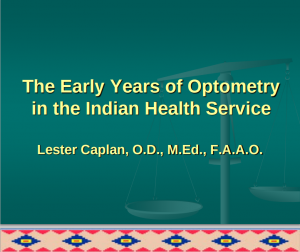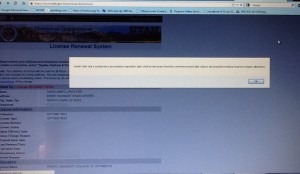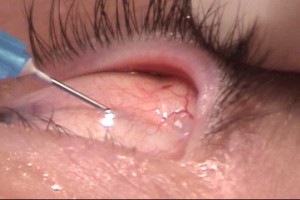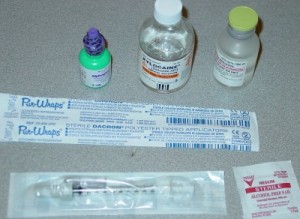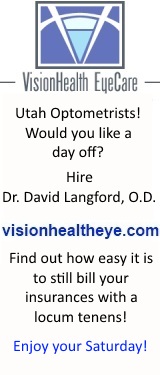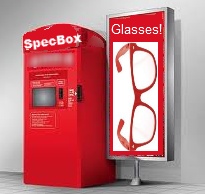
SpecBox Coming Soon?
The Utah Optometric Association is very worried about
H.B. 408 which is being introduced for the 2012 legislative session. I know they must be worried because a volunteer optometrist from the association called me, and I’m not even a member of the UOA.
It turns out they are rightfully worried because while the title, “Use of Optical Scan Machines,” might seem innocuous, what is really behind the curtain is pernicious.
While there is currently no text on the le.utah.gov website for H.B. 408, sources say that the bill’s sponsor, Greg Hughes, from Draper, UT (home of 1800Contacts) intends to allow the current prescription law to be changed to allow a person to buy glasses based on the reading of an autorefractor.
Apparently, the plan is for a company, like 1800Contacts, to set up a Glasses Kiosk in a popular store, like Walmart. (By the way, 1800Contacts has been selling glasses for a while.) The person puts their head in the machine, the autorefractor spits out some glasses numbers, a pupilometer measures a p.d., the person selects their frame and lens options, then they slide their credit card and wait for their glasses to arrive in the mail. (Maybe a nicer kiosk would measure the Rx in your current glasses and have you look at an eye chart, and factor those measurements into the numbers the kiosk “prescribes” you.)
If allowed, I predict an unintended consequence will be that no optical will adjust your glasses for free, like they currently do. You will have to show a receipt just to get your glasses adjusted, so everyone buying glasses from kiosks or internet sites will walk around looking like goobers and in pain from poorly adjusted glasses.
Other obvious consequences will be that people will walk around with headaches and blurry vision since autorefractors are notoriously inaccurate and will usually over-estimate nearsightedness and underestimate farsightedness. And say nothing of the fact that many people need prism to see straight/avoid headaches.
But here is the biggest reason to forsake this bill: People need eye exams to ensure good eye health. A refraction is only one piece of a complete eye exam. I’ve already written about the woman who only wanted more contacts, but because she had an eye exam, I saw some worrisome findings and referred her for more specialty care which discovered a brain tumor.
That’s just one patient. I’ve actually done that a couple times with brain tumors. Other times I’ve had patients whom I’ve diagnosed leukemia, diabetes, pituitary adenoma, increased cerebral spinal fluid pressure, glaucoma, macular degeneration, eye infections, allergy eyes, and more all just from a “routine eye exam.” None of these people thought there was something wrong- they just wanted new glasses or more contacts.
We can’t ignore that an eye exam is more than just looking at an eye chart and getting a refractive prescription.
But let’s say you wanted to. Let’s say you are simply a consumer advocate who wants to help people buy glasses. Your idea is to waste everyone’s time and money by making a law to separate the refraction from an eye exam. The consumer who values their eye health will simply also get an eye exam in addition to buying a glasses Rx and purchasing spectacles from a kiosk.
Okay, Utah Legislature, why are you stopping there? What if I’m a business that wants to sell antibiotics cheaper, to more people, than the present system of physicians and pharmacies? I want to set up kiosks that take your temperature. If you have a high temperature, you get vended an antibiotic. Sounds great for consumers, right? Why should eye care providers and opticals be the only ones to suffer? Make physicians and pharmacies suffer as well!
If you want to change the system, change it fairly for everyone. Let’s be just like third world countries which don’t require doctor prescriptions at pharmacies or optical shops. If it’s about consumer advocacy, what could be better, right?
Of course, you will essentially be forcing a large portion of health care providers to change professions. And don’t even mention how news reports will be full of people self treating, taking the wrong medicine for the wrong diagnosis, and dying. It’s a small price to pay for consumer choice, but since I have some libertarian leanings, I wouldn’t mind trying it out as long as every medical profession participates and not just optometrists.
However, if you don’t think that all roads should be toll roads and marijuana should be legal, then let’s continue to require prescriptions for medicines and medical devices, like glasses and contacts.
Choose one, Utah Legislature. Just be consistent across all professions to make the playing field level.
If you have an opinion on 2012’s H.B. 408, then contact your Utah lawmaker.
On a side note, I hope the sponsor of H.B. 408, Greg Hughes, is happy with himself. The UOA is burning tens of thousands of dollars (that it can’t afford) on lobbyists that only work for six weeks to fight H.B. 408. Even if HB408 is defeated this year, who knows if it will come up again next year and they’ll have to spend more money again! Mr Hughes, I’m not sure how you can sleep at night. You are causing poor optometrists to spend tons of money fighting legislation that you introduced only because a big business told you to. Even if you said you were sorry and withdraw the bill, you can’t un-burn the cash you’ve caused to be burned.
Please, lawmakers, try to think outside your wallet when making decisions about bills to consider during legislative sessions. I propose we only allow you to meet every two years in order to provide more stability for us business owners.
Tags:
1-800,
doctors,
economy,
Government,
optometrist,
Organized Optometry,
patients,
politics





